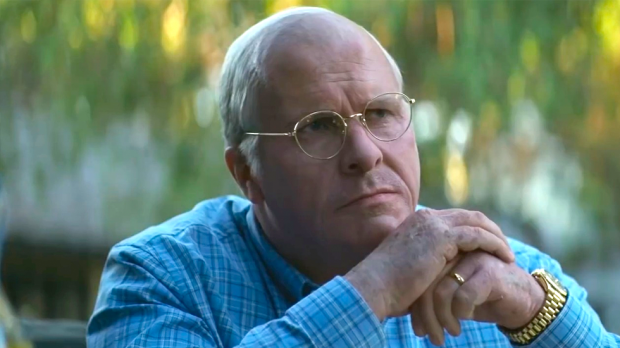
Directed by Adam McKay
Starring Christian Bale, Sam Rockwell, Amy Adams, Steve Carell
Writer-director Adam McKay started in the industry with some successful Will Farrell comedies like Talledega Nights and Step Brothers, yet he stepped up into more slightly more dramatic and bolder territory with the excellent The Big Short. His new film Vice shares that same idiosyncratic depiction of ruthless men controlling the world for their own benefit – but unfortunately now with much less desired results. The quirky sense of cinematic mediation is hopelessly lost and the smug cynicism has been ratcheted up to the point where it clouds itself with a strong sense of misguided humour and pseudo-cleverness and insight.
Vice may be a double entendre of a title, as Dick Cheney (Christian Bale) is first seen in the film drunk as a skunk and acting the fool, as is George W. Bush (Sam Rockwell) seen later on. Following closely with him throughout his early days as a college flunk-out to weaselling his way into politics, before his work in the White House that culminates with him being chosen by W. Bush as his vice president, where he has a heavy hand in the post-9/11 war on terror schemes that lead to one of the USA’s most controversial invasions in history.
It’s safe to assume we expect most biopics, particularly about politicians (and particularly about ones as secretive as this one) to take creative liberties in favour of historical accuracy. Vice even begins with a title claiming the filmmakers tried their best with the scant information they had on the secretive and contradictory Dick. But biopics do try to make their falsities feel real, whereas Vice does the opposite and all its narrative trickery and cinematic wankery seem to undermine the story it’s trying to tell. It’s moments like these where Vice can be riotously funny, but this sort of cynical humour seems to mischaracterise, simplify, or flat-out ignore most of the real-world characters’ motivations.
At a certain point, around 9/11 in the timeline, Vice actually begins to ground itself and become less focused on its own self importance and more on its leading character and the political turmoil that surrounds him. Even in a scene where Dick’s life is at his most vulnerable, Vice seems to step back and allow the actors to do the work, evoking a strange sympathy for what we’ve previously seen as a crook who would make the devil blush.
This leads up to a fitting ending, where Dick espouses his side of his story in a completely unapologetic manner. Not much of a learning lesson in morality for this man, he merely shows how he has his own warped view on his evil career. At this point the film uses its cynicism for clarifying the cognitive logic behind the shadiness of politics, rather than for cheap laughs.
And then the mid-credits sequence begins – this short moment, showing two minor characters arguing like modern-day conservative and liberal millenials on Twitter, once again strongly reiterates the film’s disdain for its audience, as well as the film’s own false sense of cleverness. Vice lacks the intricacy and clarity of early House of Cards or the tonal assuredness of The Big Short. This is the sort of story meant for a clearer filmmaker like Paul Greengrass or Oliver Stone, rather than McKay with his head up his ass.
DAVID MORGAN-BROWN